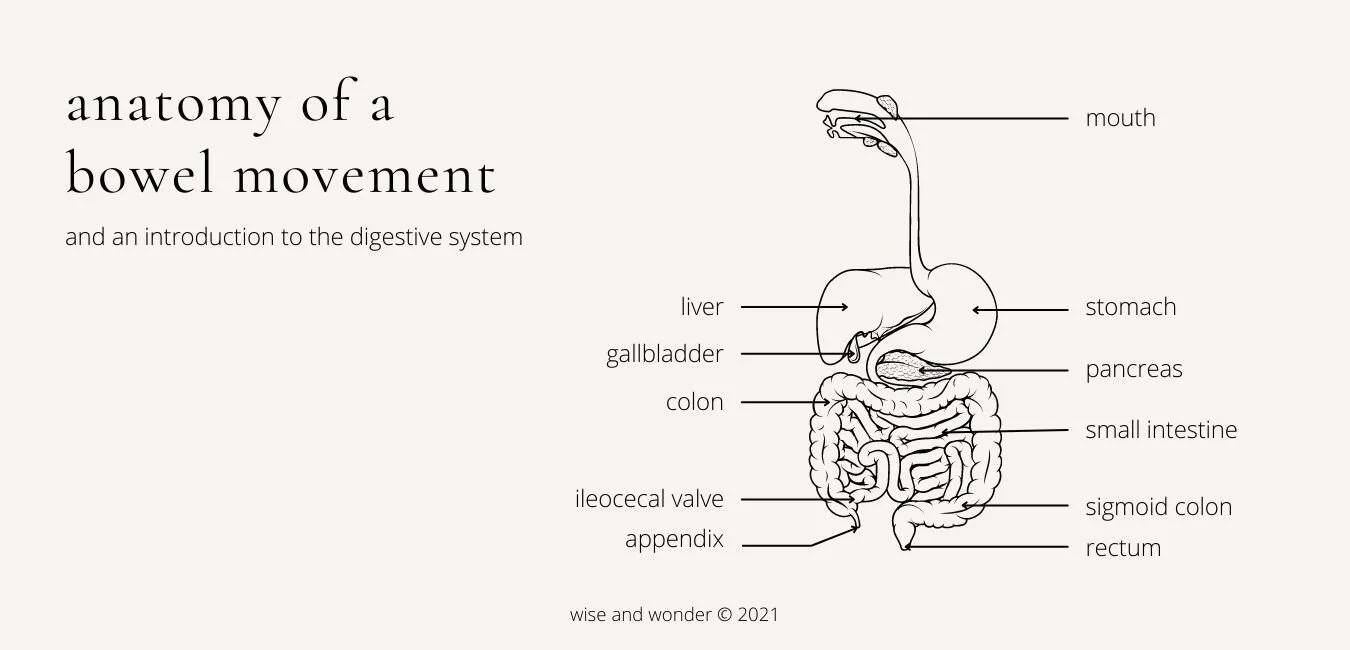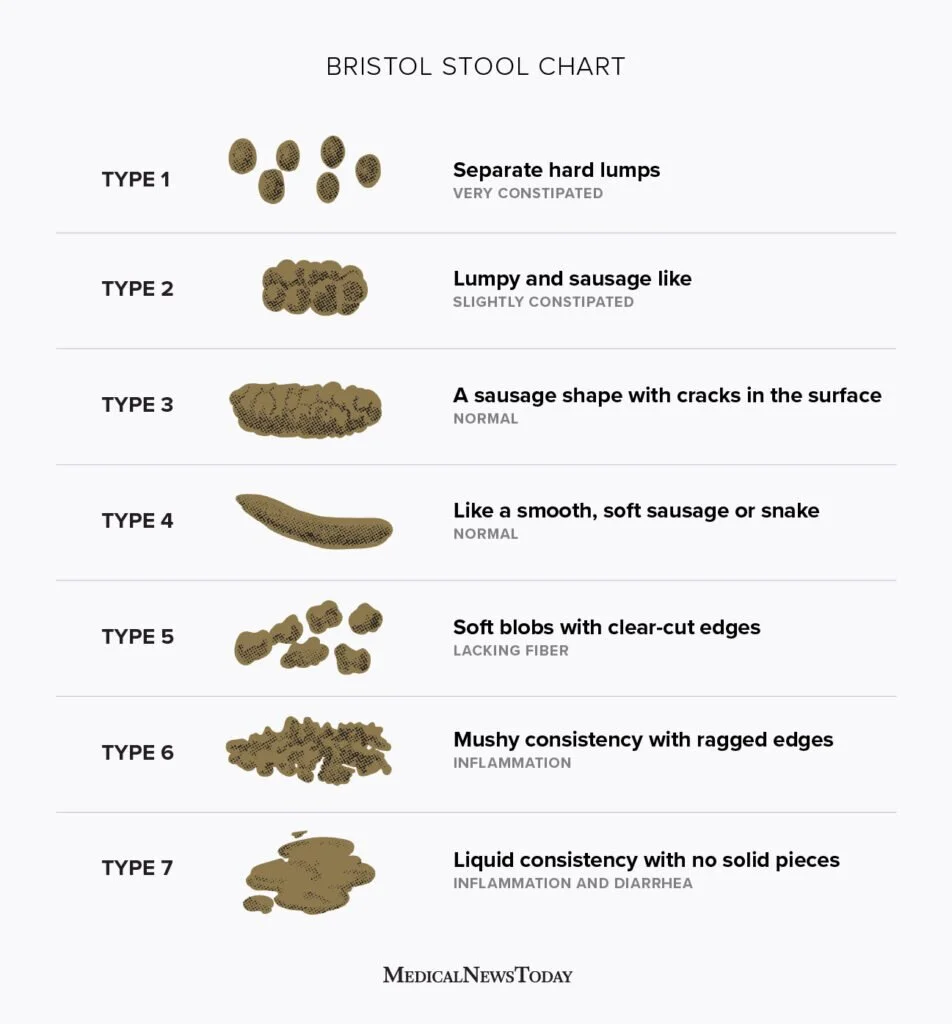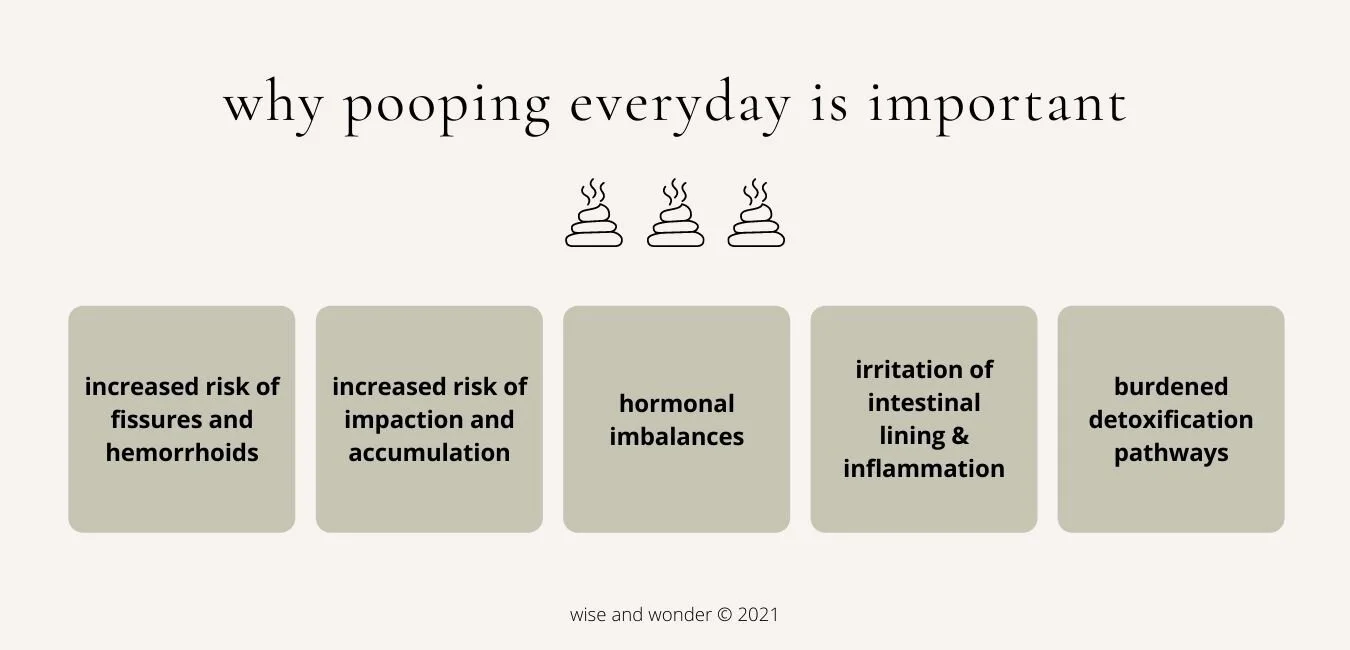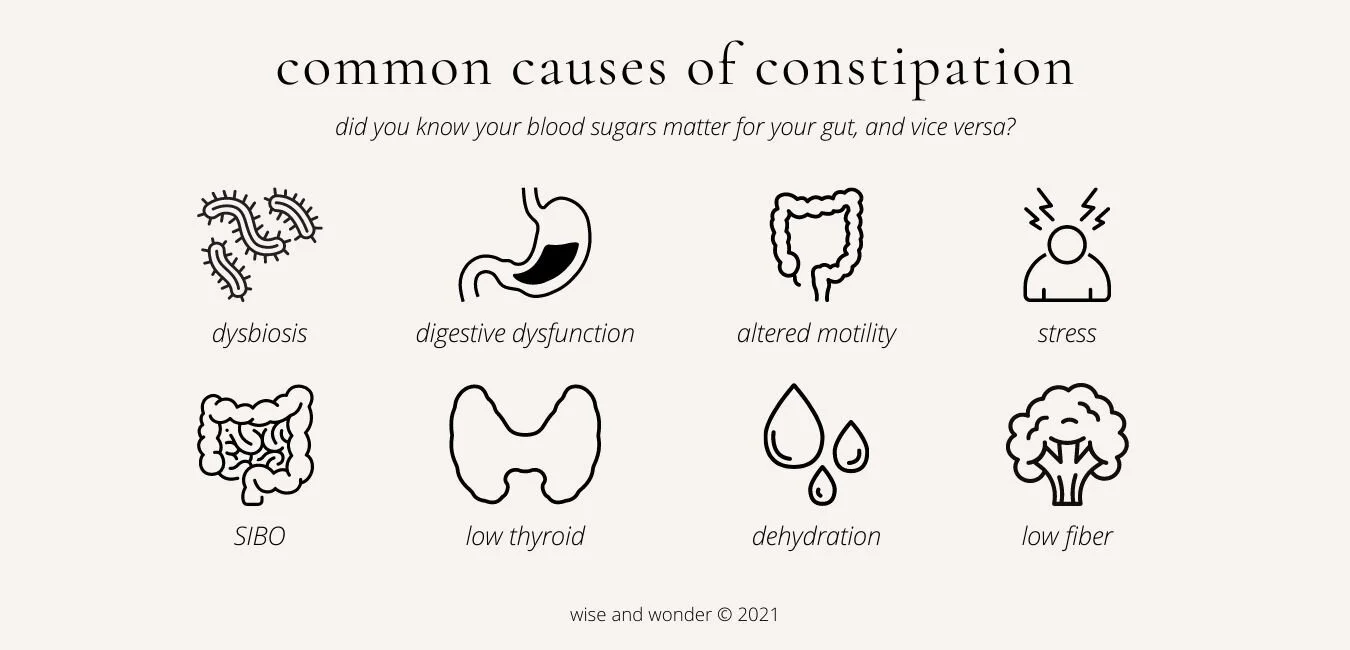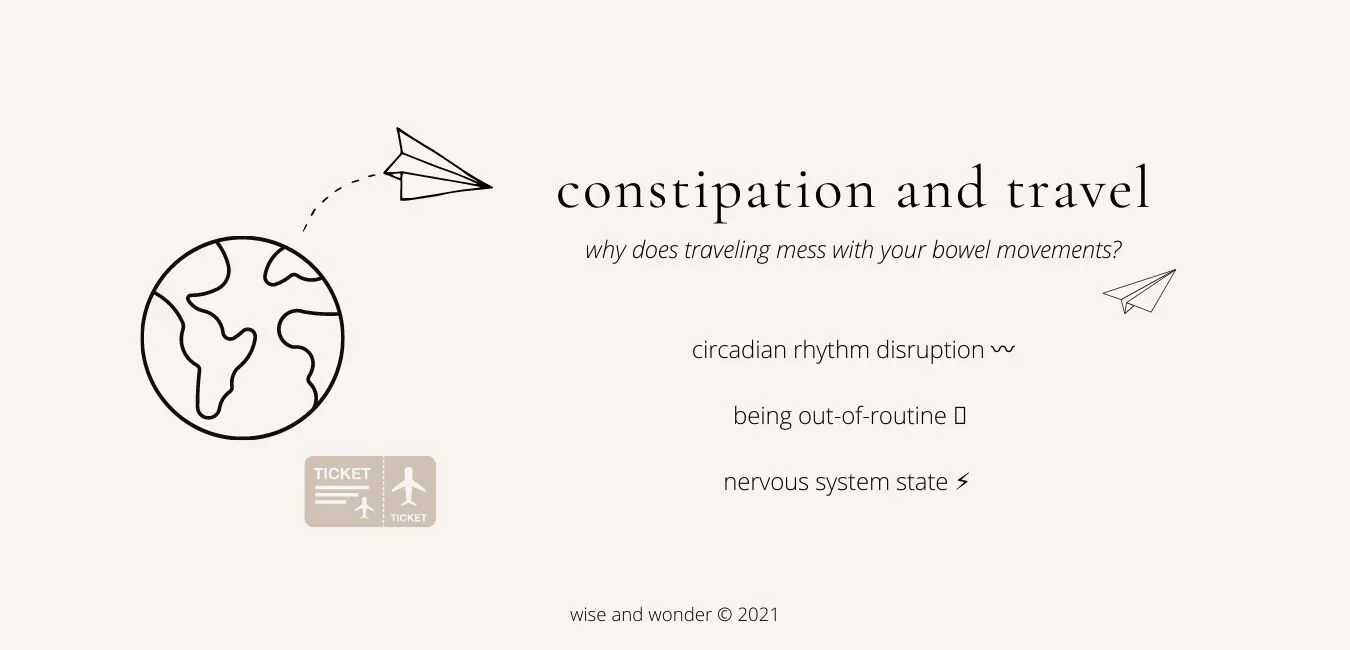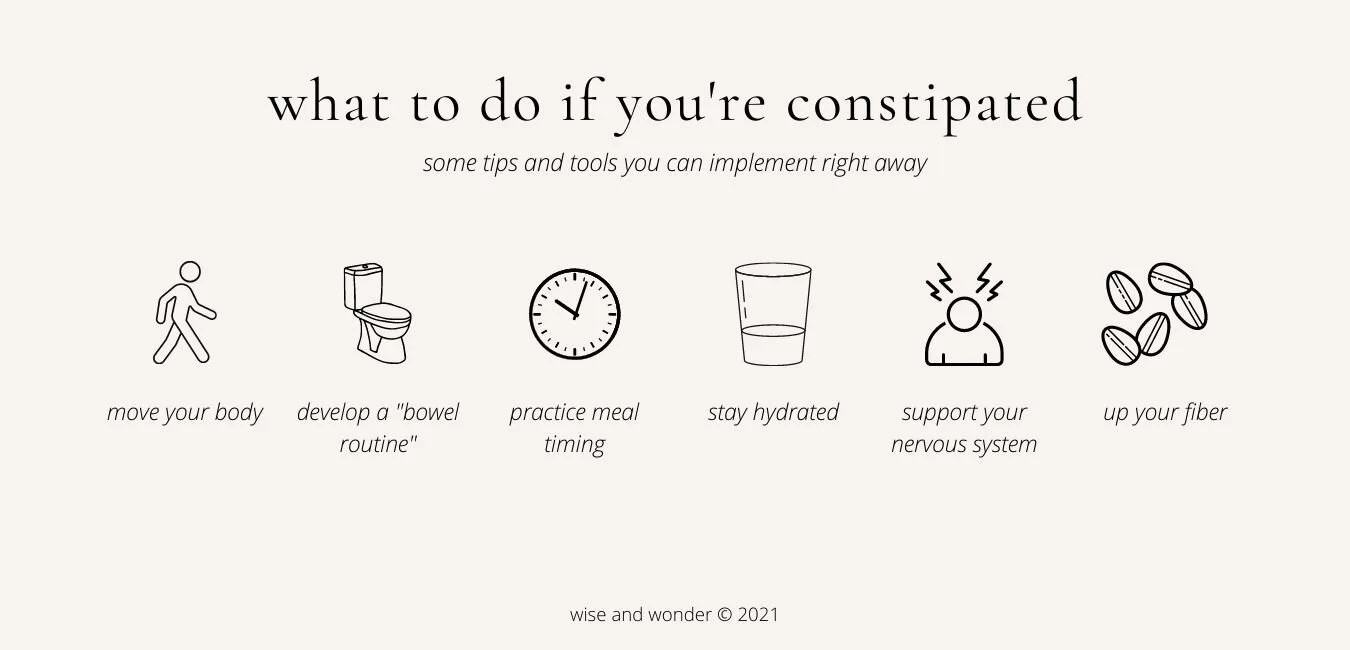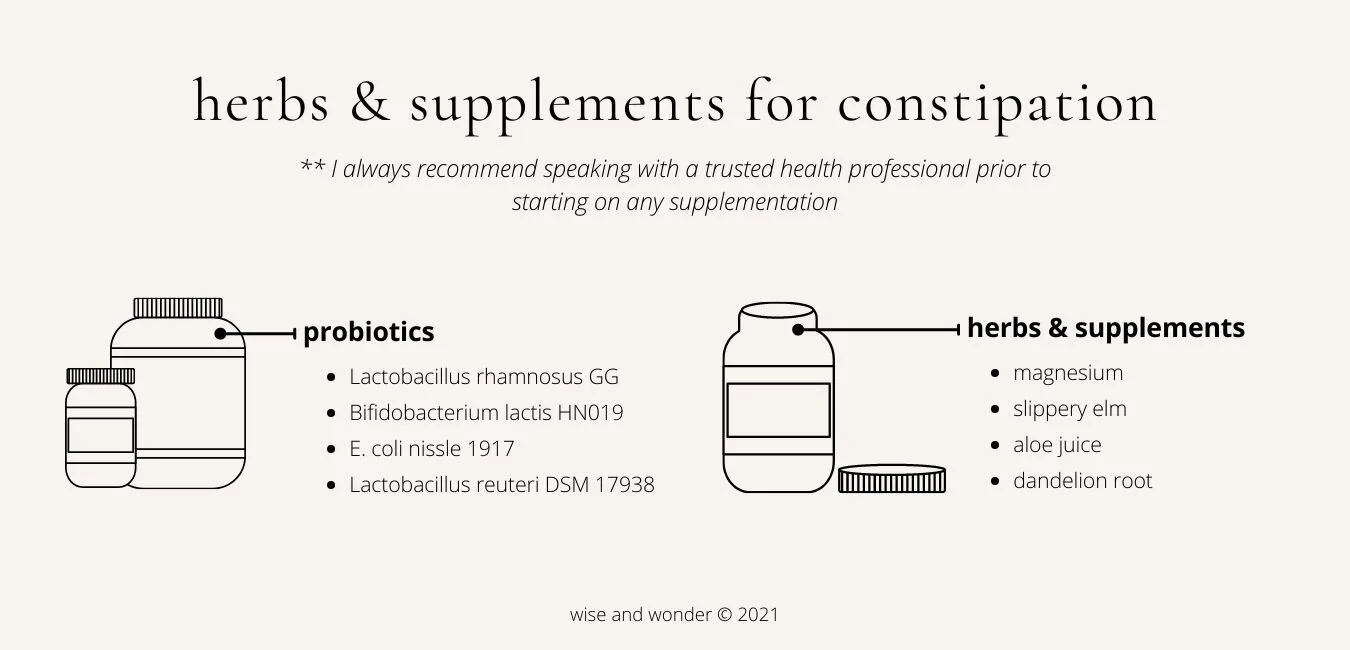A Comprehensive Guide to Constipation: Why it Happens and How to Fix it
Constipation is something that I had a very intimate relationship with for many many years of my life. I’d say it had been about 15 years that I experienced chronic constipation — an estimate that goes as far back as I have a recollection of it.
I remember being probably 10 or 12 years old, and being SO embarrassed about having bowel movements, that I would hold it in until I was in so much pain, and couldn't bear it any longer.
TMI?
You'll come to know there's no such thing in my world.
Welcome 😅
If you're reading this, perhaps you're constipated, too. Which means you know what it's like:
The discomfort. The pain. The bloating. The distention, lack of appetite, annoyance, inability to wear structured pants, lack of desire for intimacy, grumpiness.
It undoubtedly has far reaching effects on MANY aspects of life, even outside of our physical health and wellbeing. And that my friend, is exactly why I wanted to put this in-depth article together for you.
My intention with this article is to help provide some insight as to WHY you may be constipated, provide you with some ways that you can help get your bowels going, and give you hope that this isn't a life sentence!
I've personally been able to regulate my bowel movements (I think this makes us friends now that you know my bowel habits, huh?), and I know it's possible for you, too.
In this in-depth article you're going to learn:
the anatomy of a bowel movement
what constipation is, and how you can figure out from home whether you're actually constipated or not
why having bowel movements are REALLY important for your health and well-being
an introduction to the migrating motor complex (and how it's relevant for you)
common causes of constipation
what you can do if you're constipated
herbs and supplementation for constipation
OK — that being said, we have a lot of ground to cover, so let’s get into it.
Here's to healthy pooping!
Anatomy of a Bowel Movement
After we consume a meal, our food starts to get broken down in our mouth, then our stomach, and in the small intestine, where the majority of our nutrients are absorbed to be used by our body. In the large intestine, any remaining water, electrolytes, and nutrients (and even produce some nutrients, thanks to our microbiome friends) are absorbed, and — you guessed it — poop is formed!
As the remaining water and nutrients are removed in the first part of the large intestine (the ascending colon), any remaining materials continue their way to the descending colon, where stool is stored until it moves through the sigmoid colon, to the rectum, where it awaits its evacuation into the porcelain throne 🚽
There is an important function that enables us to have bowel movements. It's called peristalsis. This function involves muscle contractions in the smooth muscle layers of the intestinal lining, which moves waste along to be evacuated. We need this function to occur optimally in order to have healthy bowel movements!
So what IS constipation?
Constipation is an infrequency in bowel movements. The "definition" of constipation is a little subjective and may vary from person to person.
There are different criteria that may constitute as someone being constipated:
straining to achieve a bowel movement at least 25% of the time
feeling like you haven't completely evacuated your bowels at least 25% of the time
hard, lumpy, painful hard-to-pass stool at least 25% of the time
less than 1 bowel movement per day
Ideally, we want to see 1-3 well-formed bowel movements occur daily, and have a transit time of somewhere between 12-24 hours. Transit time is the amount of time it takes the food you eat at a meal, to be fully digested by the body, and then evacuated via stool.
At-Home Transit Testing 🛻
There are a few ways that you can test your transit time from the comfort of your own home! This will give you a better idea as to what constipation may or may not look like for you.
Here are two ways I recommend doing this:
1) The Beet Test
This one is easy, especially for fellow beet lovers. To do this test, eat 1-2 beets (depending on the size of them, and your appetite!), and take note of the date and time that you ate them. Then it's just about keeping tabs on the toilet bowl! Next time you have a bowel movement, check it out to see if you notice that your stool is red in colour.
Once you do see a bowel movement that is noticeably red in colour, take note of the day and time, and compare this data to when you ate them! This will give you an idea of what your transit time looks like.
2) The Sesame Seed Test
Similar to the beet test, you can try this one (I've also heard it called the "polka dot poo" test 😅). Mix 1-2 teaspoons of whole sesame seeds in a glass of water, and drink it back. The key here is to swallow them whole, so avoid chewing!
Like the beet test, keep track of the date and time in which you do this, and then bring your attention to the toilet bowl when you have your next bowel movement. When the seeds make their way through your system, you'll notice them speckled throughout your stool (hence "polka dot"). Take note of when you see this, and compare to see what your transit time looks like!
If you notice that your transit time falls somewhere between 12-24 hours, you may be in good shape!
That being said, there is the possibility that you fall within this timeline, but aren't evacuating fully, and may still experience mild constipation. If your transit time looks good, but you're still experiencing discomfort, a feeling like you aren't fully getting rid of all your stool, abdominal pain, bloating, etc. — you could still be experiencing this!
Image by Diego Sabogal via Medical News Today
Why having a Daily Bowel Movement is Important
Pooping every day is REALLY important. It's one of the body's major detoxification pathways.
Poop is made of a number of different waste products: dead cells and microorganisms, metabolites, indigestible parts of our food, toxic waste, inorganic substances, and water.
That being said, you can imagine that we don't want this substance hanging around for long!
Here are a few reasons why making sure you have a bowel movement at least ONCE per day, is really important:
Stool that hangs around in the colon for too long can lead to impaction and accumulation
As stool sits around in the colon, more of its water content is reabsorbed. This is where we can start to see stool become very hard, pebble-like, and become really difficult (and even painful) to pass.
Likewise, if you aren't having bowel movements regularly, we can start to see an accumulation of stool form in the colon. This can lead to a ton of discomfort, pain, heaviness and distention the gut. Not fun, hey?
Increases risk for fissures and hemorrhoids
As per the last point, constipation makes your poop dry out! This can make the stool become physically hardened, and difficult to pass. This can lead folks to have to seriously strain to get it outta them! Which can lead to hemorrhoids (swollen veins that can be super painful), and/or fissures (small tears in the skin). Also not fun.
Hormonal imbalances
One of the components of our stool is methylated hormones that are processed by the liver and sent to the gut to be rid of, like estrogen. When constipation occurs, it impacts how the body is able to rid of estrogens, and may allow for reabsorption and the recycling of this hormone, which can lead to hormonal imbalances.
It can increase the burden on other detoxification pathways
When we aren't efficiently removing of metabolites, waste products, toxins, etc. via our stool, it can increase. the burden on our other detoxification organs and pathways, such as the lymphatic system, our skin, the liver, and kidneys.
If these organs and systems have to work overtime for us to manage this accumulation, it increases their workload, which over time can tax them.
May lead to irritation of the intestinal lining & inflammation
Hardened, impacted stool hanging around in your colon over extended periods of time MAY start to cause irritation to our intestinal lining, potentially causing inflammation. Inflammation and irritation of the intestinal lining can contribute to something called intestinal hyperpermeability (AKA "leaky gut"), which can contribute to a host of widespread, systemic issues.
An Introduction to the MMC (Migrating Motor Complex)
The migrating motor complex is another function that can impact bowel movements. This is a wave-like motion that starts from the esophagus and moves throughout our GI tract to the colon.
It's often referred to as the gut's "janitor," in that it sweeps along waste & unwanted substances (things like dead cells, metabolites, pathogens, leftover food scraps, etc.) hanging around in the GI tract to later be removed from the body via stool!
The thing about the MMC is that it takes approximately 90 minutes to do its job. The catch? It can ONLY do its job when there's no intake of food. AKA, when the "hallways" are all clear (your intestines), and the janitor (the MMC), can go in and do its job.
If you don't leave enough time between meals, you may not be leaving enough time for this function to occur. We need upwards of 2 hours to digest a meal (especially if it's protein heavy), and then we need to allow for ~90 minutes for the MMC to do its thing. So, we're looking at around 3-4 hours between meals for this to occur.
3-4 hours between your meals, friend!
If you're a snacker, or just don't tend to pay attention to your meal timing, this could really be impacting your digestive function 😧 (No shame! Just something to be aware of.)
When our MMC doesn't have the chance to do its job, that's where we can start to see digestion become dysfunctional, and symptoms develop as a result; things like bloating and gas, and even abdominal pain and distention can develop. Not. Fun.
If there are food particles left in your gut that haven't been swept along, bacteria in the small intestine have the chance to indulge on these delicious goodies! This can give them the opportunity to grow in numbers — which we don't want in the case of pathogenic species, or even "beneficial" species in the wrong places. Bacteria can ferment carbohydrates that were left behind, creating gas as a byproduct, which is where we can see bloating and distention occur.
A dysfunctional MMC can also impact our guts motility, which can contribute to, you guessed it, constipation.
The takeaway here?
It's important to leave 3-4 hours between meals to let your body do its thang, AND avoid experiencing things like bloating, distention, abdominal pain, gas, and constipation.
If you ARE experiencing any of those, this is a great lifestyle practice that you can put in place right away.
What causes Constipation?
Now that we've covered a little bit of anatomy, and the importance of having daily bowel movements, let's dig into some of the reasons BEHIND constipation.
This may be a non-exhaustive list, but I will try my best to cover as many causative factors regarding what can cause constipation as possible!
1. Dysbiosis (a gut infection or imbalance)
Dysbiosis is a fancy way of saying there's some sort of imbalance in your gut bugs. Ideally, we want a good amount of "beneficial" or "commensal" microbes, compared to the "pathogenic" or "bad" bugs, which we want to see much less of. On a good day, our "good" and "bad" bugs ideally live in symbiosis together, or in "balance."
When we have too little of our beneficial bugs, or too many of our pathogenic bugs (like an overgrowth of bacteria, candida, or parasites), we can start to see digestive issues arise.
Constipation included!
2. Altered Motility
Motility refers to how our digestive system is able to move waste, fluids, food, and other matter through our digestive tract. Our enteric nervous system (the nervous system that is infiltrated throughout the gut), is responsible for most of this.
Our migrating motor complex (see above), and peristalsis need to be working adequately to make sure that things are movin' along efficiently. When these processes aren't working properly, our motility becomes affected, and we can see constipation occur as a result. Poop hangs out in our gut for too long.
Altered motility can happen for many reasons, some of them being:
food poisoning
medications
hormonal imbalances
nervous system dysregulation
stress
dysbiosis (imbalance in the gut microbiome)
SIBO
3. Digestive Dysfunction
We need access to certain digestive secretions in order for this system to work optimally for us.
We need stomach acid to help us digest proteins, protect us from bad bugs in our food and drink, to absorb vitamin B12, to create an acidic-enough environment in the stomach.
We need digestive enzymes to help us digest and break down carbohydrates, proteins, and fats.
We need bile to emulsify fats, help us absorb fat-soluble vitamins like A D E and K, remove excess cholesterol from the body, and more.
Low stomach acid over time, can lead to imbalances in the gut flora (things like SIBO, dysbiosis in the colon, etc.), which can lead to constipation.
Bile acids, a component of bile, also play a role in our bowel movements. They can help to soften stool, making it easier it pass, and help with motility. If we aren't producing or secreting enough bile, it could be impacting your poops! If you’re trying to determine what is causing constipation, t's important to look both at the health of your liver, and your gallbladder, to make sure this is working for you.
4. Low Thyroid Function
Our thyroid gland (an endocrine gland) is part of our hormone system and sits atop our windpipe on the lower front part of our neck. It has MAJOR say in the function of our metabolism.
When our thyroid isn't functioning optimally (hypo-thyroid, meaning it's under-functioning), it can slow down metabolic functions. One of them being our digestive processes!
If our thyroid isn't getting the nutrients it needs to function, our metabolism isn't supported through our nutrition and lifestyle, or likewise, its function is being impacted by other systems (like in the case of HPA axis dysfunction, where our stress system is dysregulated), it may not be capable of keeping up with its workload.
This can result in sluggish, slowed motility in the gut, which can lead to constipation in some people.
5. Stress
Our gut actually has its own nervous system, called the enteric nervous system. It's infiltrated throughout our digestive system and has BIG say in how our gut functions. It's connected to our brian via a nerve called the "vagus nerve" — which acts as a superhighway, constantly sending information back and forth between the gut and the brain.
It's no wonder our gut is often referred to as our "second brain!"
So how does stress contribute to constipation?
When we experience stress, our body shifts into our "fight or flight" mode, also known as the sympathetic nervous system. When we're here, our body's main focus is on survival. Yep, even if it's a passive-aggressive email from your boss that has you feelin' stressed, not something actually life-threatening — our body can't discern between the two!
What happens during this flight or fight response is that all bodily functions necessary for our imminent survival are prioritized: the bronchials in our lungs dilate, our heart rate and blood pressure increase, blood flow is focused on our extremities, our senses are heightened, etc.
At the same time, all "non-essential" bodily functions get shut-down. Things like reproductive hormones, immunity, and our DIGESTION becomes impacted.
This becomes problematic when we experience chronic stress, where digestion gets shut down over and over. This sets the state for digestive dysfunction: impacted stomach acid levels, impacted motility, and more.
In a nutshell, stress can also cause constipation to occur as a result!
6. SIBO
SIBO (small intestinal bacterial overgrowth), is commonly associated with constipation. SIBO occurs when bacteria are able to overgrow in the small intestine. Compared to our large intestine, where most of our microbes live, our small intestine generally has very minimal populations of bugs. When we see overgrowth occur here, it can become problematic, and lead to a whole host of digestive symptoms.
There are a few different types of SIBO: methane has, hydrogen gas, and hydrogen sulfide gas. Methane gas predominant SIBO is often associated with constipation because the methane can have an impact on our motility.
To learn more about SIBO, check out this article!
What Causes Travel Constipation?
I get asked this all the time — and as someone who personally experiences this when traveling, it can be super frustrating.
So what's the deal? Why does travel seemingly cause constipation?
One of the major reasons this occurs is because our bowels LOVE routine. Ever notice you have your "time of day" where you can expect to have a bowel movement? (I suppose if you're reading this because you're constipated, you may not be familiar.. but this is a thing!)
When we're traveling, it can disrupt our internal clock, which can impact our bodies ability to have a bowel movement.
Another thing that's important to consider here is our nervous system. We need to be in our parasympathetic, "rest and digest" state in order for digestion to functional optimally. Our body needs to feel safe. Traveling, being out of routine, staying in and experiencing different places, can affect our nervous system which in turn can affect our bowel movements!
Disruption of our circadian rhytmn could also potentially play a role here. If our biological rhythms are disrupted while we're traveling — especially if we're traveling across time zones — it can impact our internal processes, including digestion, which can contribute to constipation.
What to do if you're Constipated
Now that we've covered some of the many reasons that you may be experiencing constipation, let's dig into some of the good stuff: what you can do about it.
Here are some things to help relieve constipation:
1. Make sure you’re well hydrated
Let's start with getting a couple of the basics out of the way!
Hydration is a really important consideration for our digestive function. It plays a massive role in our small intestine's ability to absorb nutrients, AND it's a large part of our colon's function in forming and excreting stool.
In the large intestine, the remaining water and nutrients are absorbed. If you aren't adequately hydrated, this process may dry out your stool too much, leading to hard-to-pass, pebble-like poops.
This is a great, simple place to start if you're constipated! Aim for approximately 1/2 your body weight in ounces per day, and try to listen to your body for its thirst cues, as every body is different, and has different H2O requirements!
2. Make sure you’re getting enough fiber in
Another digestive basic, but a really important one! We need adequate fiber intake to be able to form healthy bowel movements.
If you aren't getting enough plant foods in, you may not be consuming enough fiber to optimally bulk stool. We need enough sustenance to create well formed-bowel movements, that are easy and effortless to pass.
A cautionary note about fiber: if you haven't been getting much in lately, my advice is to take it low and slow when it comes to integrating more fiber.
If you're just now trying to intentionally incorporate more plant foods into your daily nutrition, you may experience digestive discomfort! The idea is to slowly increase your intake of different types of fiber, to increase populations of beneficial microbes in the gut, and to create beautiful, well-formed poops.
3. Practice Meal Timing
We've already gone over the migrating motor complex (MMC) at length above, which explores why meal timing is so important for digestion, and how it can be contributing to digestive issues like constipation, bloating, gas, abdominal pain and distention, etc.
This is a really profound lifestyle practice. It's one of those simple things, that can have a HUGE impact. And fast.
The idea here is to leave 3-4 hours between each meal (yes, this includes snacking 😬).
If you have a meal, and find that 2 hours later you're starving, it could be that you didn't eat enough at your last meal, or that you didn't have enough protein and fat at your meal to help keep you satiated.
No problemo. You've gotta eat when you're hungry. Just try to reflect back on what you at that last meal, and see where there might be room to either eat more, or add in more protein, fat, and fiber.
Here's what this could look like in practice, if you wake up at 7, for example:
Breakfast by 8 am
Lunch between 11:30-12
Snack around 3-3:30
Dinner around 6:30-7 Bed by 10-11
This isn't meant to feel restrictive, and it has to be conducive to your lifestyle! It's important to find what works for you.
4. Develop a "Healthy Bowel Routine"
There are a few lifestyle practices and habits that can make it easier for your bowels to do their thang. Sometimes they just need some TLC.
Here are a few things to explore:
Drink a large glass of water when you wake up. Room temperature or warm water is best for digestion. You can add lemon or apple cider vinegar if you like.
Spend 10-15 minutes (or more) doing something that nourishes your nervous system before you check your phone or laptop. This could be a walk, breathing exercises, meditation, stretching, self-massage, a shower, etc. Your digestion functions optimally when your in your "rest-and-digest" state.. and this helps you stay there!
Make time to have a bowel movement. Sitting on the toilet at the same time every morning for 5-10 minutes can help to form a bowel habit, if you're struggling with constipation
Eat your breakfast within 1-2 hours of waking up, and before you have your coffee or matcha if those are part of your morning routine.
A couple of other things to consider:
Try using a "squatty potty" or stool to elevate your knees while you're having a bowel movement (this helps re-align the colon and rectum in a way that makes for ideal bowel movement passing).
Try an abdominal massage, like this one, to help move stool and gas along.
5. Prioritize nervous system support
Our digestive function is closely tied to our nervous system. Our gut actually has its OWN nervous system, called the enteric nervous system, which is connected to our brain via the vagus nerve.
Hence the term "gut-brain axis," if you've ever heard of it.
When we're stressed, nervous, anxious, busy, worried, and "always on the go" — we may be functioning in our "fight-or-flight" mode, which is our sympathetic nervous system. When we're in this state, our digestive function gets shut down. It's not prioritized.
Spending the majority of time in this state, can lead to digestive issues over time. Chronic stressors do not set the stage for optimal digestive health, long-term.
That's why nervous system support is so important. We want to try to be in our "rest-and-digest," or parasympathetic state, as much as possible. This is where our digestive system functions at its best.
Here are some ways you can support your nervous system:
Explore breathwork. Breathing practices like the box breath (4x4 breath), and 4-7-8 breath can coax your body into the rest-and-digest state.
Explore something creative (colouring, drawing, painting, collaging, embroidery - decorating, doing your makeup, etc.)
Try laying down with your legs up the wall (this is I think a yoga pose that sounds like exactly what it is). While there's no hard science behind it (that I'm aware of), it could be worth trying out!
I personally love doing it at night before bed while doing deep breathing or reading. It could be really supportive for your nervous system, anxiety/stress, etc. It also feels like it takes a lot of pressure and weight off of the lower half of the body, which feels nice.
Try meditation. I know, I know, this can't be the first time you've heard this one, but even short meditations can be really profound in down-regulating the nervous system. Check out this app called "insight timer" — it's free and has a range of meditations from 1 minute to over an hour!
Try journaling. You can explore doing a "brain dump when you wake up, or before you go to bed, a "free-flow" to get everything out of your head, start a gratitude journal, try bullet journaling, etc.
Have fun. This might sound silly, but having fun/experiencing pleasure is absolutely underrated with regards to the effect it has on our stress levels and our overall health. Try to schedule something fun into your schedule if not every day, at least every week.
6. Move your body every day
Movement is important for our digestion. If you are feeling stagnant, and aren't moving your body much, you may see constipation as a result! Moving your body helps to pump blood throughout our body, including our digestive organs!
This can help our digestive organs and muscles function better, improve intestinal activity, and can improve our digestive motility through peristalsis. Twisting exercises that help to massage organs and muscles in the abdominal area can also help with motility. Same with strengthening muscles in our abdominal area through resistance movements!
Walking, yoga, and strengthening movements can do wonders for your constipation.
Herbs & Supplements for Constipation
While none of these options are "solutions" to constipation (especially chronic constipation), as it's really important to dig into WHY you're experiencing constipation in the first place, and start there, they can be helpful to move things along in the meantime.
Dandelion Root Tea
Dandelion root is an herb that's really supportive for the liver. It's a bitter herb that helps to promote production and secretion of bile, which as we just learned, can play a role in constipation when we aren't secreting adequate amounts.
It's also considered a diuretic and can help to bring more water into the bowel, which can improve bowel movements.
Slippery Elm
Slippery elm is a mucilaginous herb, meaning that is absorbs water, creating a gel-like substance, which may be helpful in cases of constipation! It's also a soluble fiber, which can be helpful for softening stool and bulking it, making it easier to pass.
You can enjoy this as tea, also!
Aloe Juice
Now, this isn't the same aloe that you buy as a green gel from the drug store to slather all over your crisped shoulders after a week in the Caribbean sun.
Aloe juice, derived from the aloe plant, can have a laxative effect due to compounds it contains, called "anthraquinone glycosides." I'd recommend going low and slow with aloe juice, and increase the amount you're consuming over time.
Grab some if you can at a health food store, and follow the recommendations on the nutrition label!
Magnesium (citrate or oxide)
Magnesium is an important mineral that has many roles in the body. One of the roles magnesium has is to help with muscle relaxation. This can be helpful in the case of peristalsis, where muscles of the colon contract and relax to move substances and stool along the colon, which is how we poop!
These two specific forms of magnesium can be particularly helpful for constipation. They aren't as readily absorbed into the bloodstream, like magnesium bis-glycinate and magnesium threonate, and act more directly in the gut as osmotics. This means that they bring more water into the bowel, helping to both soften stool and move things along. Magnesium oxide has a more extreme laxative effect compared to citrate. I seldom use this form, and mostly stick to magnesium citrate for constipated clients, for symptom support while we're working on root cause.
Probiotics for Constipation
I'm not going to dig too deep into probiotics in this article, but what I did want to cover is that there are certain strains of probiotics can be helpful for constipation.
If you're interested in looking into probiotics to support your gut health, and specifically constipation and motility, look for probiotics that have these specific strains (it could have one of these strains, or multiple):
Lactobacillus rhamnosus GG
Bifidobacterium lactis HN019
E. coli nissle 1917
Lactobacillus reuteri DSM 17938
And so, there we have it. A pretty comprehensive guide to constipation
I hope you've learned something, had a few ah-ha moments, and resonated with something in here that you'll be able to integrate into your own life, to support healthy bowel movements.
Constipation is REALLY important to re-regulate, not only because of the discomfort it causes, and how it can impact your day-to-day life, but also because of the physiological effects it has.
By this point, you've now learned:
the anatomy of a bowel movement 🤓
what constipation is, and how you can figure out from home whether you're actually constipated or not
why having bowel movements are REALLY important for your health and well-being
an introduction to the migrating motor complex (and how it's relevant for you)
common causes of constipation
what you can do if you're constipated 💩
herbs and supplementation for constipation
In case you need more support with this
If you try to implement what you've learned here, and STILL can't get to the bottom of your constipation, find that it's still not completely resolving, or experience multiple digestive symptoms, then I'd love to invite you to dig deeper.
In my practice, I work 1:1 with clients in my gut health program called the Gut Restore Method.
It's a 4-6 month, comprehensive program designed to restore your digestion, recharge your energy, and rebalance your hormones via a root-cause approach.
I offer functional stool testing, that allows us to gain a better understanding of what's happening with your microbiome, how your digestive processes are doing, and more.
If you want to dig deeper, with the support of someone who's been there too (hey!), then I'd love to invite you to book in a FREE discovery call.
This FREE 20-minute discovery call is a great way for us to get really clear on what your current health struggles are (maybe constipation?), and get a better understanding of what your goals are (to resolve your constipation!), so we can chat about what the next best steps are for you to achieve your health and wellness goals.
This is your opportunity to ask me all your Q's and find out whether The Gut Restore Method is the right fit for you, to finally get to the root cause of your constipation.
You can book in your FREE spot in my calendar, here ☎️
